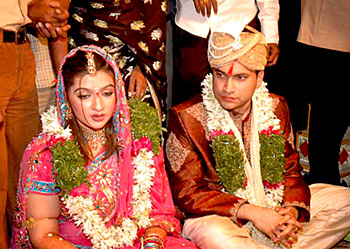 Agrasen attached great importance to family life and instituted 18 gotras and restricted people of the same gotra from intermarrying, a custom which prevails even today. These gotras were not derived from Agrasen`s eighteen sons, as is commonly believed by the Agrawals. Rather these were derived from 18 leading families of Agrohas which were selected for this purpose by him.
Agrasen attached great importance to family life and instituted 18 gotras and restricted people of the same gotra from intermarrying, a custom which prevails even today. These gotras were not derived from Agrasen`s eighteen sons, as is commonly believed by the Agrawals. Rather these were derived from 18 leading families of Agrohas which were selected for this purpose by him.
The majority of Agrawals are Hindus but quite a number of them have embraced Jainism. This difference in religious affiliation does not constitute a barrier to marriage between these two religionists. An appellation popularly used as a surname by members of the Vaishya community, particularly the Agrawals, is Gupta. Gupt, means profound or deep. A synonym very often used for the community is `Bania`, derived from the word vanik, meaning a trader or a shopkeeper.
The Agrawals are orthodox and tradition bound. They visit Haridwar with their families for the ritual bath in the Ganga and do not normally miss such religious fairs as the Kumbh, the solar eclipse fait at Kurukshetra and the annual gathering at Garhmuk-teshwar. Those who succeed in completing the pilgrimage to the four religious centres {dhams) of Hinduism-Kedarnath, Sringeri, Puri and Dwarka-regard themselves as very fortunate.
The younger generation seems not to share the enthusiasm of their elders for religious and spiritual activities.
The Agrawal appears to combine in himself the materialism of the West with the religiousness of the East.
Social customs and practices among them are basically the same as those of other Hindus but the details vary from state to state. For instance, the rites and rituals of the Marwari Agrawals of Rajasthan are slightly different from those prevailing elsewhere.
For the Agrawal marriage is an occasion for great extravagance. Many families ruin themselves in the matter of dowry, an evil the community is particularly plagued with.
Though economical and rather miserly in personal affairs, they give away thousands in charity and often make generous donations and contributions for religious organisations and educational and charitable institutions.









